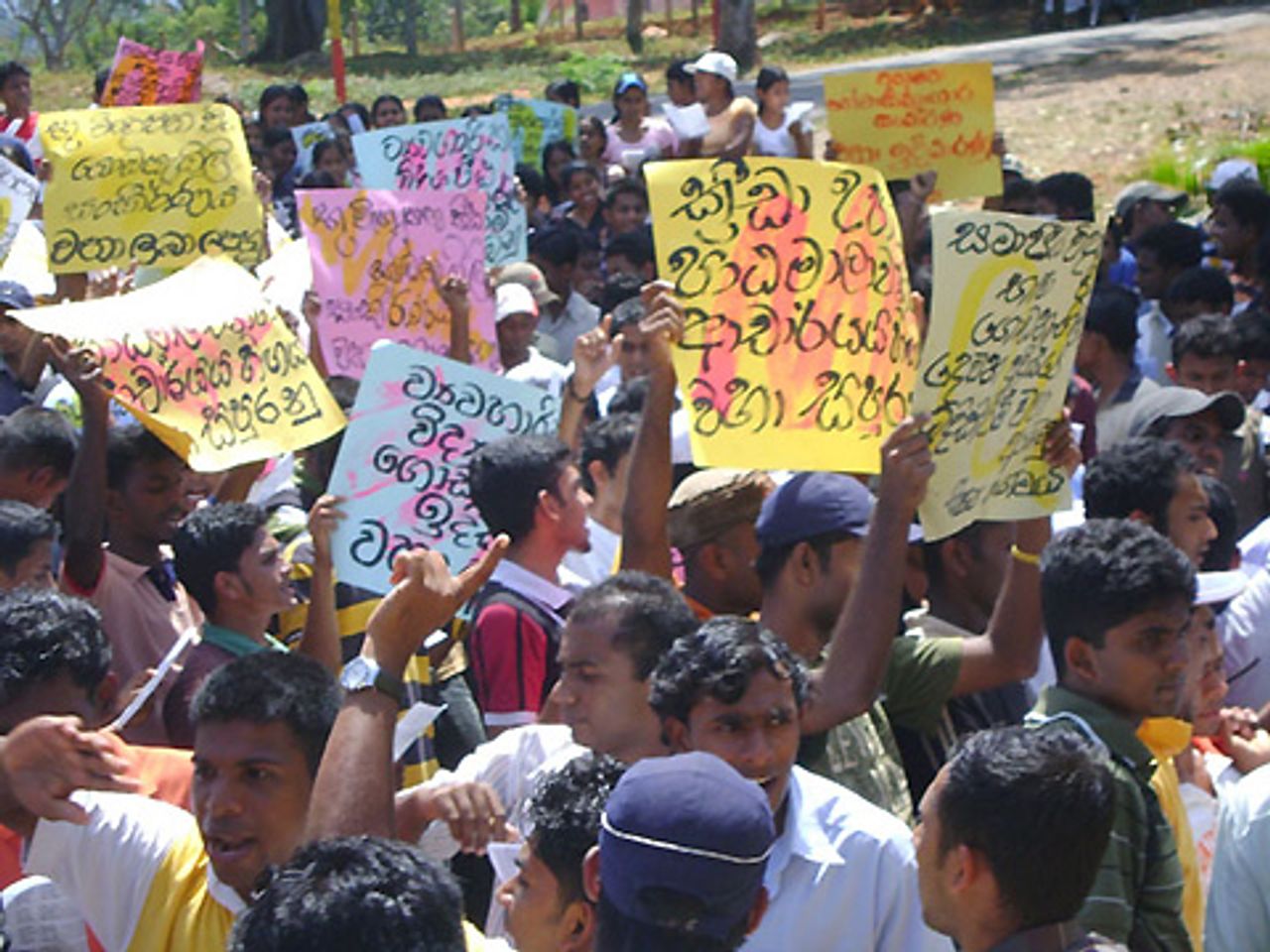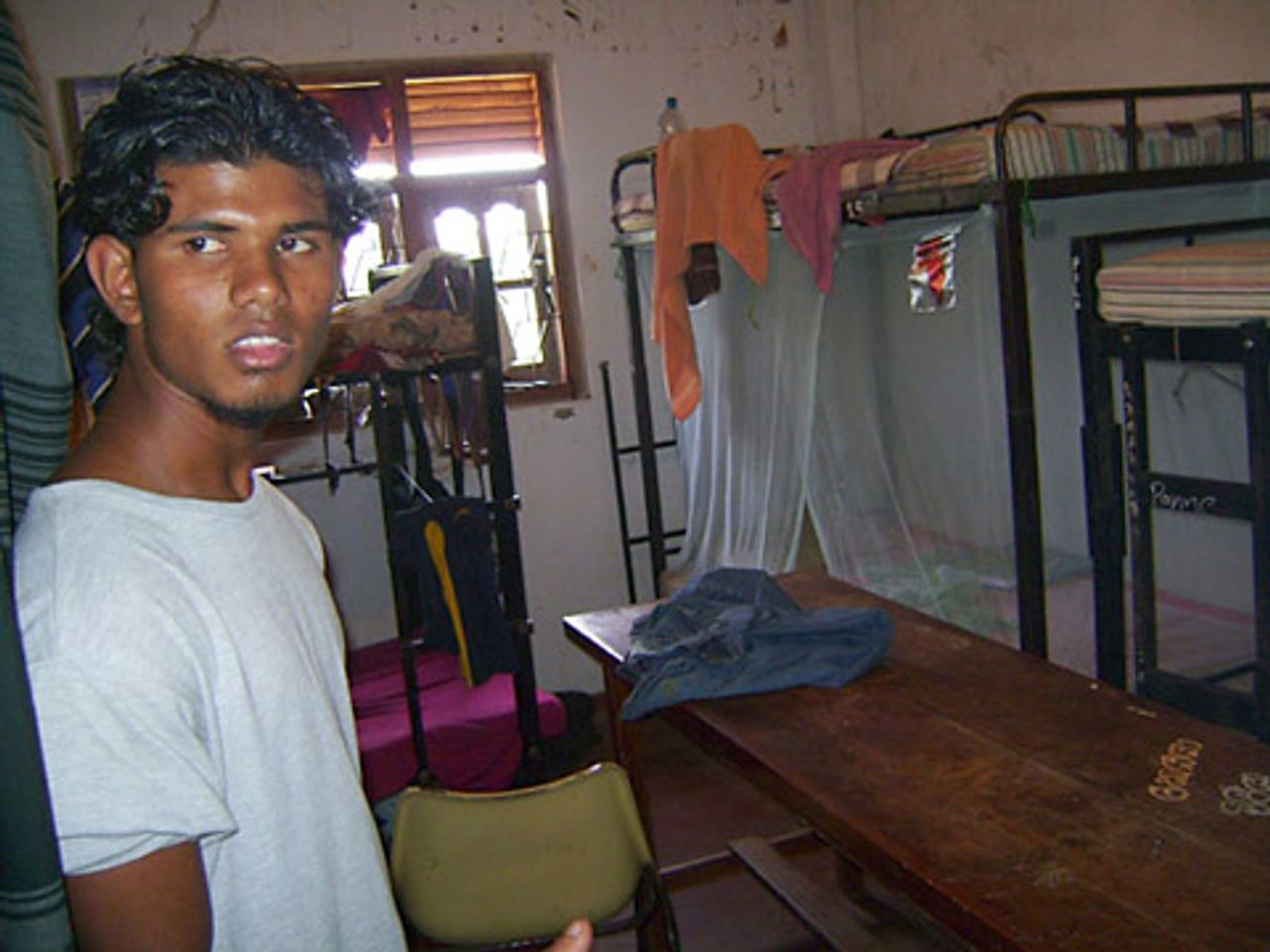Nearly 2,000 students from five faculties of Sabaragamuwa University in Belihuloya, 160 km east of Colombo, held a protest inside the university premises on July 8. They presented 16 demands for basic facilities such as lecture rooms, hostels, labs, canteens and sports grounds.
The demonstration was held in support of Social Sciences and Languages Faculty students who have been boycotting classes since July 1 over the lack of essential facilities for a decent education. The protest is an indication of growing opposition among students and youth to the erosion of free education by President Mahinda Rajapakse’s government.
 A section of the student demonstration
A section of the student demonstration
Sabaragamuwa University, established in 1995, has around 3,000 students. Six universities, including Sabaragamuwa, were opened in the mid-1990s after protests by students and parents over the lack of university places for students who had qualified for admittance.
The new universities were hurriedly located in buildings erected for other purposes. For instance, Sabaragamuwa University’s main premises were previously used as workers’ accommodation for the Samanala Wewa [Samanala Lake] electric power project. Until 2007, the Applied Science and Agriculture faculties were located at Buttala, about 100 km from the main campus, in abandoned buildings once used for a housing project exhibition.
Despite the creation of the new universities, this year 100,000 students qualified for university entrance but only 20,000 received places. A WSWS and International Students for Social Equality (ISSE) team met with protesting Sabaragamuwa students on July 8.
Samanthi, a Social Sciences and Languages student, angrily explained the conditions in the university. “Our classrooms are like huts for chicken,” she said. “Chairs are broken. Students have to carry chairs from one classroom to the other. Lecturers were recruited to the university from Colombo University but no professors. They are reluctant to come here because of lack of transport and accommodations, as well as the long distance.
“There are two main hostels called ‘Samanala’ and ‘Singharaja’. In the Samanala hostel, there are 48 students but only two bathrooms. There are eight students in one little room and no study rooms.
 A student shows cramped sleeping quarters
A student shows cramped sleeping quarters
“The cabinet approved new buildings in 2001, and the foundation stone was laid in 2006 but the work is still incomplete. Due to the lack of rooms, lectures are held until 9 p.m. in the Applied Science Faculty and 7 p.m. in ours. We get a bursary of 2,500 rupees [$US21.75] every month. But it is hardly enough for our food. The government is clipping out free education.”
A second year Tamil student from the Geometrics Faculty said there were no labs for physics. Because of the shortage of lecture halls, one batch of students was sent to fieldwork to allow other batches to attend lectures. The computer unit had not yet opened.
The geometrics student added: “Our hostel is a house taken by the university on lease. There are about 30 such hostels. Six of us have to share one room. But in some rooms there are eight or nine residents. In the dry season, lack of water is a big problem. Other sanitary facilities are also insufficient.
“A master plan has been passed for the university but it has not yet been implemented due to insufficient funding. The government’s priority was the war. That is why we have such poor facilities in our universities.”
Successive governments and the university authorities have responded to student protests by attacking the students and giving false promises. In October 2007, Sabaragamuwa’s Applied Science students refused to stay in Buttala, and travelled to Belihuloya, but the university authorities rejected their demands for the faculty to join the main campus.
After students held a sit-in protest for three months in front of the University Grants Commission offices in Colombo, the Rajapakse government sent the police to disperse them, arresting three students. Later the faculty was shifted to the main campus, but the facilities remain inadequate.
The Inter University Students Federation (IUSF), which is controlled by the Sinhala extremist Janatha Vimukthi Peramuna (JVP), is doing everything it can to limit the students’ struggle and isolate them from the working class.
Sabaragamuwa University Students Council president Anushka Supun Kumara told the WSWS: “We engage in protests with the IUSF. As with the IUSF, we do ‘students politics’.” Challenged to explain the failure of previous protests to satisfy students’ demands, he replied: “We are not doing workers’ politics. If we do that, we cannot win students.”
The IUSF and JVP leaders blame the poor state of the universities on wastage and corruption on the part of the university authorities. The same argument is made by the JVP and its trade unions, which insist that official corruption and waste prevent workers’ demands being met.
These claims hide the fact that the Rajapakse government slashed funds for welfare programs, subsidies, education and health services to massively increase military expenditure for its communalist war against the Tamil minority. The JVP and IUSF not only supported Rajapakse taking power but vociferously supported the war.
Despite its military victory over the Liberation Tigers of Tamil Eelam (LTTE), the government is increasing the size of the armed forces. The troops will be used for a permanent occupation of the north and east and to suppress the struggles of workers and students. The government has now launched an “economic war” in the name of “nation building” in order to impose the burden of the world recession and the military expenditure on working people.
Students must unify their struggles with the working class to defend free education and demand decent facilities. Above all, this means turning to an international socialist program based on abolishing the capitalist system and reorganising society to meet the social needs of all rather than the profits of a wealthy few. This is the perspective advanced only by the WSWS and ISSE.
